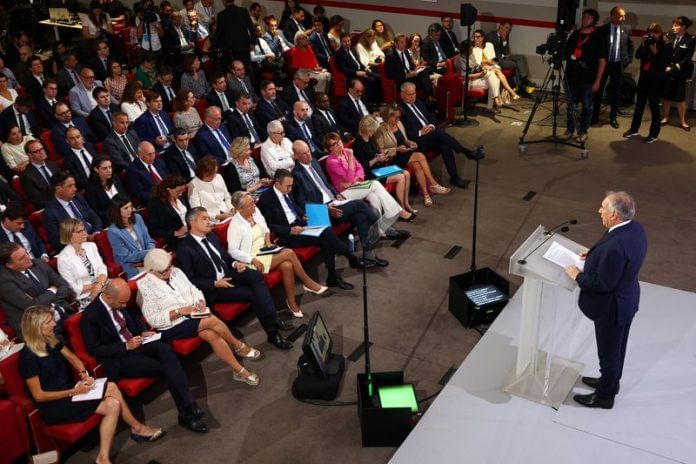By Elizabeth Pineau
PARIS (Reuters) -French Prime Minister Francois Bayrou will hold a high-stakes confidence vote in parliament on September 8 over unpopular plans to clean up France’s public finances.
If he loses the confidence vote, Bayrou’s minority government will fall.
The centre-right prime minister acknowledged seeking the confidence of a very fragmented parliament was a risky bet.
“Yes it’s risky, but it’s even riskier not to do anything,” he told a press conference, referring to what he said was the major danger the country faced due to its huge debt pile.
The confidence vote, he said, will gauge whether he has enough support in parliament for his 44 billion euro ($51.51 billion) budget squeeze, as he tries to tame a budget deficit that hit 5.8% of gross domestic product last year, nearly double the official EU limit of 3%.
“We face an immediate danger, which we must tackle … otherwise we have no future,” Bayrou said about the debt burden, adding that the confidence vote would focus on whether lawmakers agree with the gravity of the danger, and choose the path to fix it.
With his announcement on Monday, Bayrou is getting in ahead of the opposition, which was likely to call a no-confidence vote over his budget plans.
Far-right party chief Jordan Bardella said that Bayrou had, in any case, de facto announced “the end of his government”.
“The RN will never vote in favour of a government whose decisions are making the French people suffer,” he said on X. Leader Marine Le Pen said the RN would vote against Bayrou – as did the Greens.
The hard left France Unbowed also said the vote would mark the end of the government.
The votes of Socialist lawmakers will be decisive for Bayrou’s fate because if they join other left-wing parties and the far right in voting against the government, there will likely be enough votes to oust it.
The confidence vote will take place just two days before planned protests, which have been called for on social media and backed by leftist parties and some unions.
The September 10 call for general protests has drawn comparisons to the Yellow Vest protests that erupted in 2018 over fuel price hikes and the high cost of living.
The “gilets jaunes” protests spiralled into a broader movement against President Emmanuel Macron and his efforts at economic reform.
Bayrou has proposed scrapping two public holidays and freezing welfare spending and tax brackets in 2026 at 2025 levels, not adjusting them for inflation. He repeated that some of his proposals, including scrapping the bank holidays, could be tweaked.
($1 = 0.8536 euros)
(Additional reporting by Makini Brice, Dominique Vidalon, Gabriel Stargardter, Leigh Thomas; Writing by Ingrid Melander; Editing by David Holmes and Alison Williams)
Disclaimer: This report is auto generated from the Reuters news service. ThePrint holds no responsibility for its content.




